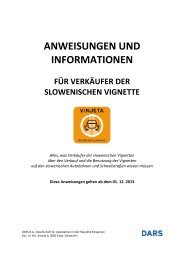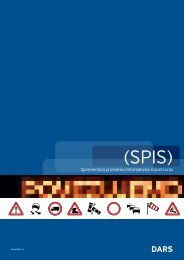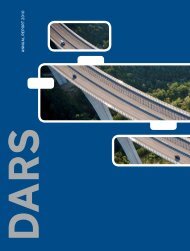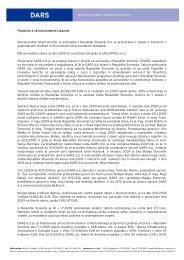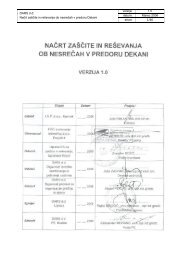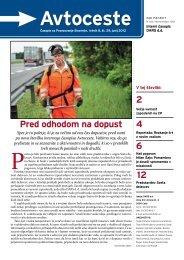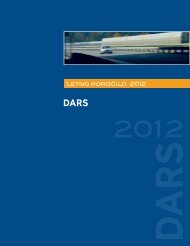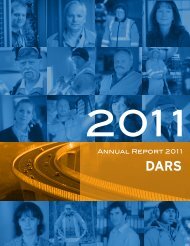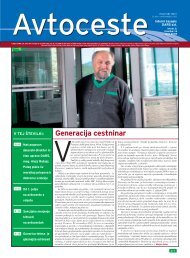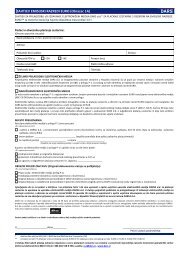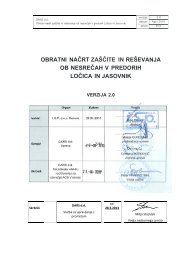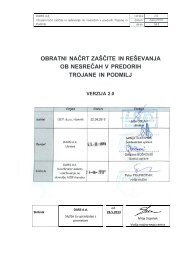DARS_porocilo 2007 ANG.indd
DARS_porocilo 2007 ANG.indd
DARS_porocilo 2007 ANG.indd
- No tags were found...
Create successful ePaper yourself
Turn your PDF publications into a flip-book with our unique Google optimized e-Paper software.
Short-term Investments in other Entities<br />
In line with Z<strong>DARS</strong>, the Company is required to invest any surplus cash in State or own securities, debt<br />
securities, or deposits with first-class banks domiciled in Slovenia.<br />
Short-term investments denominated in foreign currency are translated into the national currency<br />
(euro) using the middle exchange rate of the Bank of Slovenia applicable on the balance sheet date.<br />
Any exchange rate difference arising from translation increases or decreases the Company’s long-term<br />
liabilities to the State.<br />
Short-term Operating Receivables<br />
Short-term operating receivables comprise short-term trade receivables, short-term input VAT receivable,<br />
short-term European funds receivable, and short-term interest receivable on sight and other deposits.<br />
Short-term operating receivables are initially recognised at amounts indicated in relevant documents,<br />
provided their collection can be assumed. Interest is calculated in accordance with the relevant contract<br />
upon maturity and on the balance sheet date. There are no foreign currency-denominated receivables<br />
among short-term trade receivables under state-owned assets managed by the Company.<br />
Cash<br />
This item comprises balances in bank accounts denominated in local or foreign currencies. The latter<br />
are translated into local currency using the middle exchange rate of the Bank of Slovenia applicable<br />
on the balance sheet date. Exchange rate differences arising from translation increase or decrease the<br />
Company’s long-term liabilities to the State.<br />
Mutual Relations Between the State and the Company<br />
The Balance Sheet showing state-owned assets under management of the Company also comprises<br />
the State’s receivables due from the Company associated with the use of state-owned assets under<br />
management to finance company-owned assets. The Balance Sheet showing company-owned assets and<br />
liabilities comprises the Company’s liabilities to the State in the same amount.<br />
The Balance Sheet showing state-owned assets under management also comprises liabilities to the<br />
Company associated with the use of company-owned assets to finance state-owned assets under<br />
management. The Balance Sheet showing company-owned assets and liabilities comprises the Company’s<br />
receivables due from the State in the same amount.<br />
The Consolidated Balance Sheet does not include the above-mentioned transactions, as they are offset<br />
against one other.<br />
Provisions and Long-term Accrued Costs and Deferred Revenues<br />
Long-term accrued costs and deferred revenues set up in the previous periods are reduced by the amounts<br />
used in accordance with the plan and purpose for which they were set up.<br />
Until 1 January 2004, long-term accrued costs and deferred revenue were set up under state-owned<br />
assets under management in the amount equal to the share co-financed by the users of ETC tags. These<br />
are long-term provisions for guarantees given for ETC tags or liabilities to reimburse the non-depreciated<br />
portion of purchase money for such tags in the event that they are returned by users (the Company has<br />
given users a period of 7 years to return the tags). These long-term provisions are initially recognised<br />
66 ANNUAL REPORT <strong>DARS</strong> d.d. <strong>2007</strong> FINANCIAL REPORT



